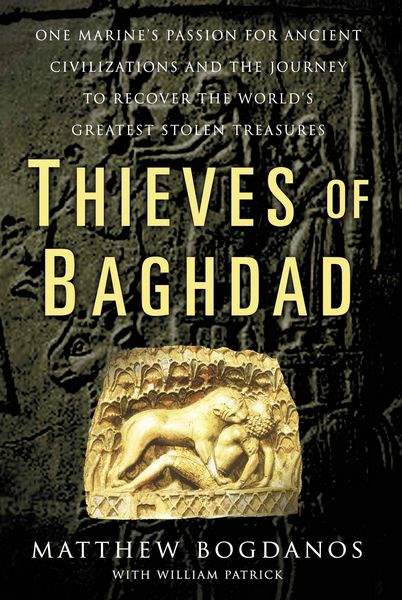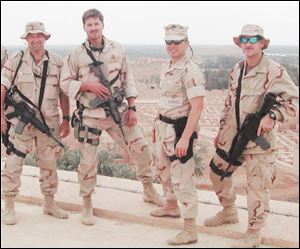
Soldier in a culture war: Matthew Bogdanos fought to save Iraq s treasures
4/15/2007
FEA 04/12/2007 handout photo *** not blade photo Cover of 'Thieves of Baghdad"

Matthew Bogdanos, second from right, in Baylon in April, 2003.
Before 9/11, Matthew Bogdanos worked as a district attorney in New York City, boxed occasionally for sport, and was father to two small children and expecting a third child with his wife, Claudia.
But that day, their apartment near the World Trade Center was destroyed, buried in pulverized glass, asbestos, and masses of paper.
Shortly thereafter, his life took another turn: he was called to active duty from the Marine Corps Reserves. Colonel Bogdanos would spend much of the next four years in Iraq and Afghanistan, where he would discover a fascinating niche in the world of war: stolen cultural artifacts.
Investigator/soldier Bogdanos, 50, will share his zeal Thursday at 7 p.m. when he speaks in the Great Hall of the Stranahan Theater at Authors! Authors!, sponsored by The Blade and the Toledo-Lucas County Public Library. His 2005 book, Thieves of Baghdad, subtitled One Marine s Passion for Ancient Civilizations and the Journey to Recover the World s Greatest Stolen Treasures, is 300 pages based on Bogdanos s 45,000-word report to the military and co-written with William Patrick.

FEA 04/12/2007 handout photo *** not blade photo Cover of 'Thieves of Baghdad"
Expect a high-energy talk with moments of intense heat, opinion, and anecdotes full of drama and intrigue. Expect to hear about the countless gallons of tea he drank in Iraq (and ordered his soldiers to drink), a ritualistic requirement for winning the trust of everyone from museum directors and politicians to taxi drivers. The 5-foot, 7-inch Bogdanos speaks without a microphone, walks through the audience, shows about 100 slides, and quotes Homer and Jefferson.
And he d like nothing better than for a member of the audience to stand up and volunteer to be the savior for the preservation of cultural heritage.
I would like it to be someone else, who s more important than I am, has decision-making authority, who has a budget, someone who has international cachet. I want it to be someone else. I will gladly hand over this mantle to anyone who wants it. The problem is I haven t found anybody to want it in four years.
What he can t fathom is why the director general of the United Nations Educational, Scientific and Cultural Organization won t take the lead.
That s what the C stands for! he says, sounding mad enough to spit. If UNESCO is not there to preserve cultural heritage in times of conflict oh wait! it s in their charter!
I want them to do something. I want them to roll up their sleeves and get the job done. I want somebody with regard to the global criminal enterprise that is antiquities trafficking, this absolute catastrophe of Homeric proportions, I want somebody to be Winston Churchill.
But until then, it will be Bogdanos, for whom the hunt for thousands of Iraqi treasures kindled a passion second only to his family, which now includes a dog and kids ages 8, 7, 5, and 2.
His investigation, beginning just after the April, 2003, looting of Iraq s national museum in the heart of Baghdad, was never officially sanctioned and was somewhat of a deviation from his assignment to search out terrorist financing and weapons.
It was, in fact, my own improvisation, he wrote, and a good many people some in positions of authority had said that it was a harebrained stunt that was going to end my career.
In fact, response within the military, and especially the Marine Corps, has been uniformly positive, he notes. And all I m doing is telling the truth.
Stolen treasures
As the chaos of war descended on Iraq, almost 14,000 pieces were stolen from the museum. Almost 6,000 have been returned from eight countries, he says. Another 62,000 that were removed by museum staff and government officials have been returned. The amnesty program he instituted at the Iraq Museum resulted in people dropping off treasures in trash bags and boxes, no questions asked.
At the district attorney s office in New York, he continues tracking down stolen antiquities as a senior investigative counsel in the rackets bureau. It s an international business that ends up in New York, London, Paris, and Tokyo, after beginning in countries where traces of ancient life are still being excavated, such as Iraq, Cambodia, Egypt, and Italy. There s an intermediary stop in Geneva, Dubai, or Beirut for warehousing and laundering the items paperwork, called provenance.
The book, he says, has been financially devastating for him. He has given well over 100 free talks, even paying his own airfare. (He will be remunerated for his talk in Toledo.) All royalties from book sales will be donated to the Iraq Museum, which is far more complicated than one might imagine.
The premise is, there s somebody at the Iraqi museum to accept the money. The second premise is, money in the Middle East? You give money to somebody in the Middle East, first of all it s an insult, second of all it s a joke. You don t give money. You give services.
His intention is to hire around-the-clock museum guards, train them for six months, and supply them with equipment, radios, and body armor. But you also need investigators who can track down leads. You have to have both.
He was a reluctant author.
My first response was not only no but hell no I m not writing a book! But the publisher at Bloomsbury got to him by saying if he didn t write it, someone who wasn t in Iraq as long as he was would. Moreover, they d probably have a political agenda.
Nobody on my team was there for more than 90 days, he says.
William Patrick, with whom Bogdanos worked on Thieves of Baghdad, added depth by forcing the soldier to answer why, by organizing the information so it wouldn t follow strict chronological order, and hammered into my head beginning, middle, end for every chapter, every book, Bogdanos says.
Matthew Bogdanos will speak at 7 p.m. Thursday in the Great Hall of the Stranahan Theater, 4645 Heatherdowns Blvd. Tickets are $10; $8 for students. Information: 419-259-6266.
Contact Tahree Lane at: tlane@theblade.com or 419-724-6075.